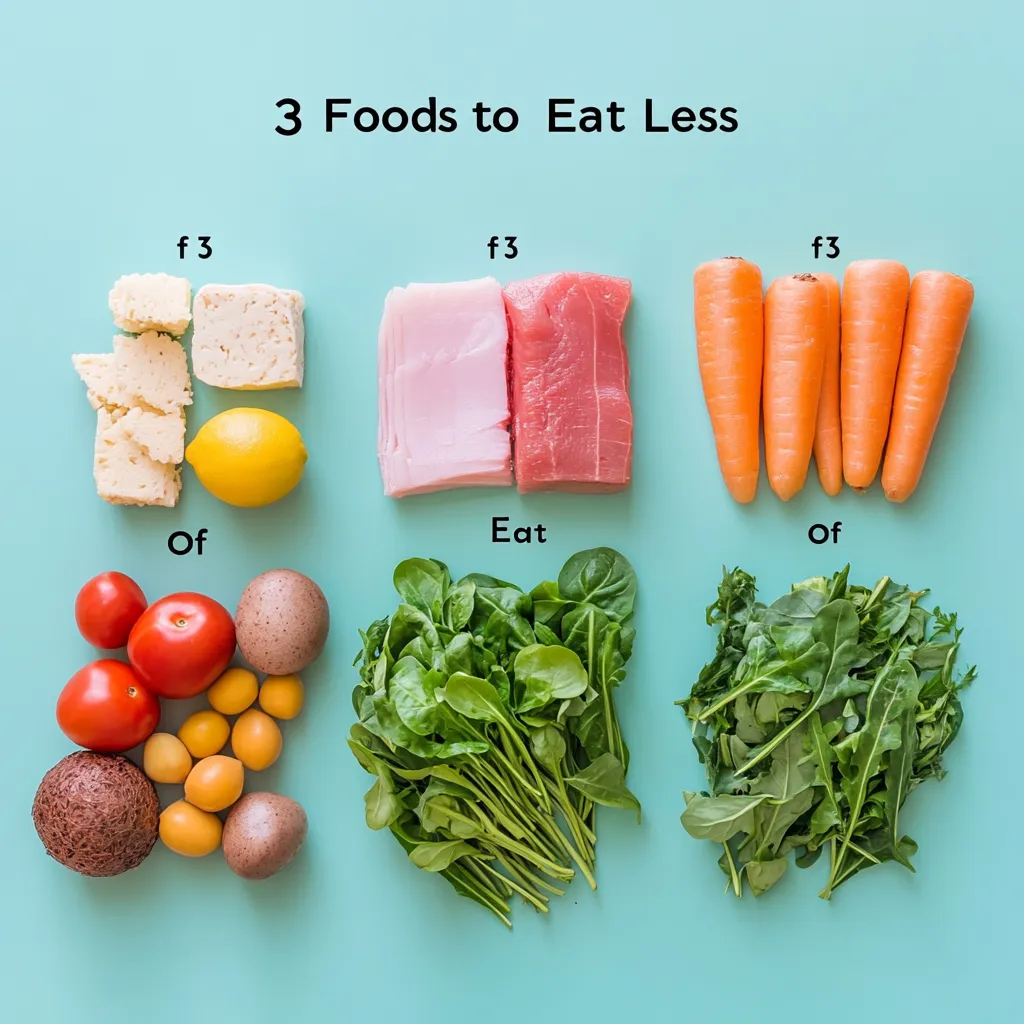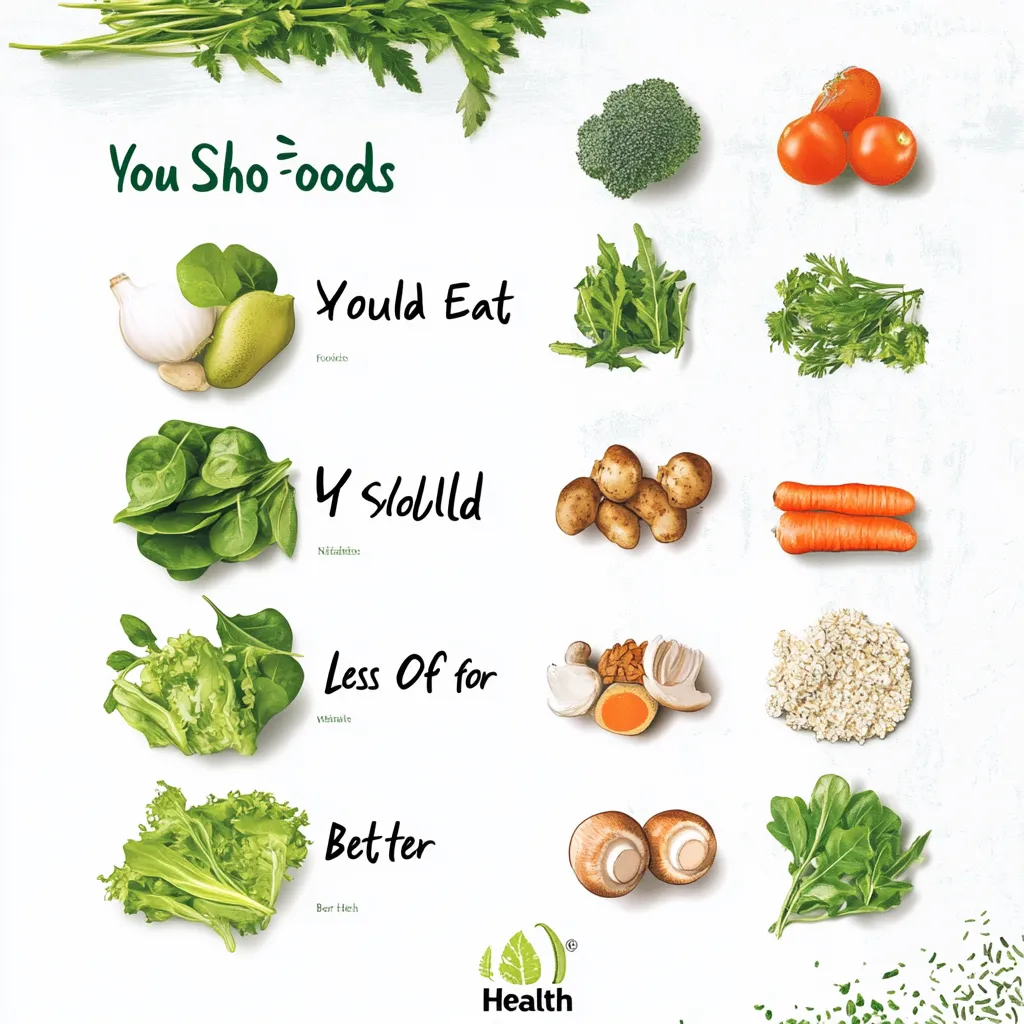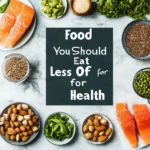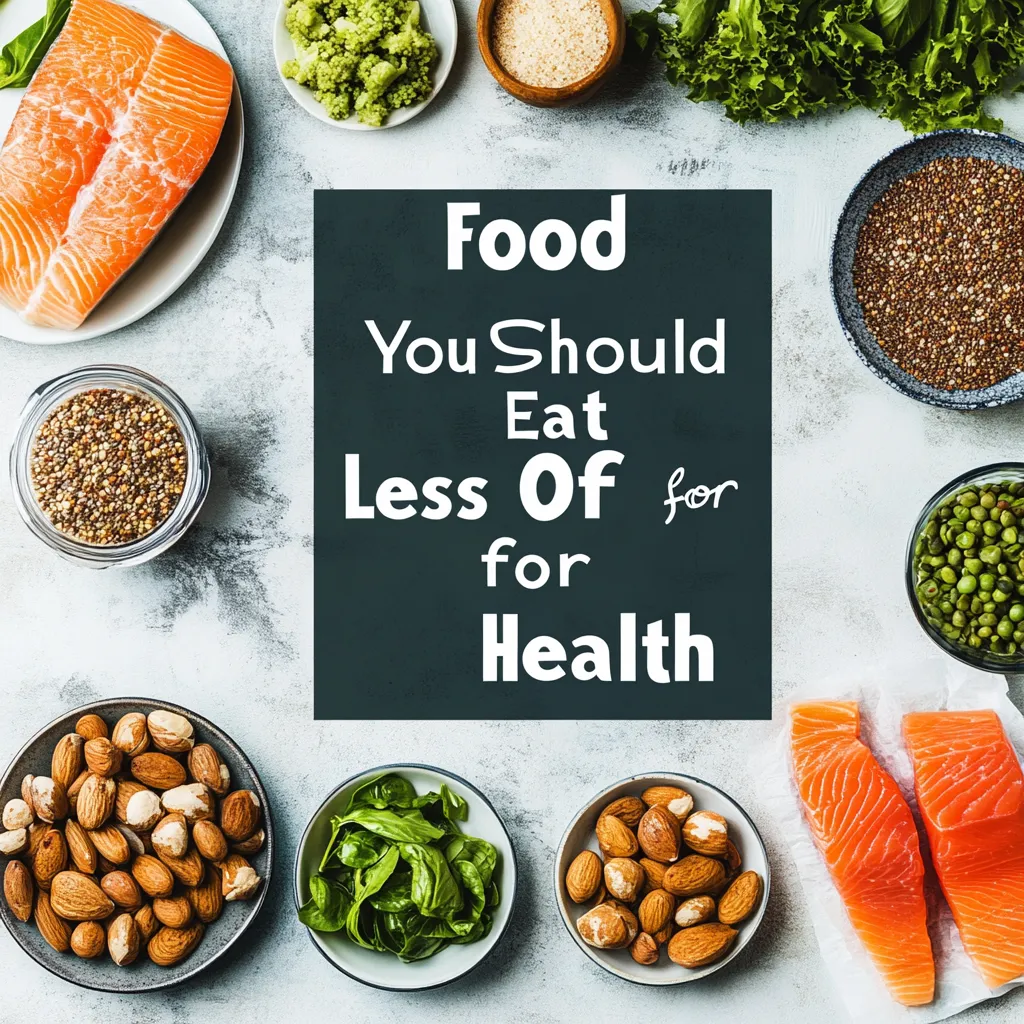Making smart food choices is one of the most powerful ways to protect your long-term health and well-being. While many articles focus on what you should eat more of, understanding which foods you should eat less of is equally important for maintaining optimal nutrition. Learning about the specific foods you should eat less of to stay healthy can transform your diet and overall wellness. Research consistently shows that reducing certain foods can dramatically lower your risk of chronic diseases, boost energy levels, and improve overall quality of life.
The modern diet often includes processed foods, added sugars, and unhealthy fats that contribute to inflammation, weight gain, and various health complications. By identifying and limiting these problematic foods, you can take a significant step toward better health without completely overhauling your entire diet.
Table of Contents
Why You Should Know About Foods You Should Eat Less Of
Understanding which foods you should eat less of isn’t about restriction – it’s about making informed choices that support your body’s natural functions. When you identify the specific foods you should eat less of to stay healthy, you can take a significant step toward better health without completely overhauling your entire diet.
• Reduces inflammation throughout your body • Lowers risk of chronic diseases like diabetes and heart disease
• Improves energy levels and mental clarity • Supports healthy weight management naturally • Enhances digestive health and gut function • Boosts immune system function
The Three Foods You Should Eat Less Of to Stay Healthy
These are the top three foods you should eat less of to maintain optimal health and prevent chronic diseases:
1. Processed Meats and Deli Products
Processed meats represent one of the most concerning categories of foods for long-term health. These products undergo various preservation methods that create potentially harmful compounds while stripping away beneficial nutrients.
Why Processed Meats Are Problematic
Processed meats like bacon, hot dogs, sausages, and deli meats contain high levels of sodium, nitrates, and preservatives. The World Health Organization has classified processed meats as a Group 1 carcinogen, meaning there’s sufficient evidence they cause cancer in humans. Regular consumption of processed meat products has been linked to:
• Increased colorectal cancer risk • Higher rates of heart disease • Elevated blood pressure from excess sodium • Greater risk of type 2 diabetes
Healthier Alternatives to Processed Meats
Instead of relying on processed options, choose fresh, lean proteins that provide essential nutrients without harmful additives:
• Fresh chicken breast or turkey • Wild-caught fish like salmon, sardines, or mackerel • Grass-fed beef in moderation • Plant-based proteins like lentils, chickpeas, and quinoa • Organic eggs from pasture-raised chickens
2. Refined Sugar and Sweetened Products
Refined sugar consumption has skyrocketed in recent decades, contributing to widespread health issues across all age groups. Added sugars hide in countless processed foods, making it easy to consume far more than the recommended daily limits.
The Hidden Dangers of Excess Sugar
The average American consumes approximately 17 teaspoons of added sugar daily – nearly three times the American Heart Association’s recommended limit. This excessive sugar intake leads to numerous health complications:
• Blood sugar spikes and insulin resistance • Increased inflammation throughout the body • Weight gain and difficulty losing excess pounds • Dental problems including cavities and gum disease • Higher risk of heart disease and stroke • Accelerated aging at the cellular level
Smart Sugar Reduction Strategies
Reducing added sugars in your diet doesn’t mean eliminating all sweetness. Focus on these practical approaches:
Read nutrition labels carefully – Sugar appears under many names including high fructose corn syrup, agave nectar, and dextrose.
Choose whole fruits instead of fruit juices or dried fruits with added sugar.
Prepare homemade versions of typically sweet foods like granola, salad dressings, and baked goods.
Use natural sweeteners sparingly – Options like raw honey, pure maple syrup, or stevia can satisfy sweet cravings in smaller amounts.
3. Ultra-Processed Snack Foods
Ultra-processed foods represent the most problematic category among the foods you should eat less of in modern diets. These products contain multiple ingredients you wouldn’t find in a typical home kitchen, including artificial colors, flavors, preservatives, and chemical additives.
Understanding Ultra-Processed Foods
Ultra-processed snacks like chips, crackers, packaged cookies, and convenience foods undergo extensive industrial processing that transforms basic ingredients into shelf-stable products. This processing typically:
• Removes beneficial nutrients like fiber, vitamins, and minerals • Adds unhealthy fats including trans fats and excessive omega-6 oils • Increases sodium content far beyond natural levels • Includes artificial additives that may disrupt hormonal balance
The Health Impact of Ultra-Processed Foods
Regular consumption of highly processed snack foods correlates with numerous health issues:
• Increased calorie intake due to poor satiety signals • Higher inflammation markers in blood tests • Disrupted gut microbiome affecting digestion and immunity • Greater risk of obesity and metabolic syndrome • Reduced nutrient absorption from other foods
Wholesome Snack Alternatives
Replace processed snack foods with nutritious options that satisfy cravings while supporting health:
Fresh vegetables with hummus, guacamole, or tahini Raw nuts and seeds – almonds, walnuts, pumpkin seeds, or sunflower seeds Fresh fruits paired with natural nut butter Homemade trail mix with unsweetened dried fruit and nuts Plain Greek yogurt with berries and a drizzle of honey

How to Successfully Reduce Foods You Should Eat Less Of
Start with Small, Sustainable Changes
Transforming your diet by reducing the foods you should eat less of doesn’t require dramatic overnight changes. Gradual dietary improvements tend to be more sustainable and less overwhelming than complete overhauls.
Week 1-2: Replace one processed snack daily with a whole food alternative Week 3-4: Swap processed meats for fresh proteins in half your meals Week 5-6: Reduce added sugars by preparing more meals at home
Master the Art of Meal Planning
Strategic meal planning makes it easier to avoid problematic foods while ensuring you have healthy options readily available. Dedicate time each week to:
• Plan balanced meals featuring whole foods • Prepare healthy snacks in advance • Cook protein sources in batches for easy meal assembly • Stock your pantry with nutritious staples
Learn to Read Food Labels Effectively
Understanding food label information empowers you to make informed choices about packaged products. Focus on these key areas:
Ingredient lists – Choose products with fewer, recognizable ingredients Added sugar content – Look for products with minimal or no added sugars
Sodium levels – Select options with lower sodium content Serving sizes – Pay attention to realistic portion sizes
Nutritional Benefits of Reducing These Foods
Improved Energy and Mental Clarity
Many people experience significant energy improvements within weeks of reducing processed foods, added sugars, and ultra-processed snacks. This occurs because:
• Blood sugar levels stabilize throughout the day • Nutrient absorption improves from whole food sources • Inflammation decreases allowing better cellular function • Sleep quality often improves supporting natural energy cycles
Enhanced Digestive Health
Your digestive system responds positively to whole food nutrition by:
• Increasing beneficial gut bacteria diversity • Improving nutrient absorption efficiency
• Reducing digestive inflammation and discomfort • Supporting regular bowel movements through adequate fiber intake
Long-term Disease Prevention
The most significant benefit of reducing these three food categories is chronic disease prevention. Research demonstrates that people who limit processed meats, added sugars, and ultra-processed foods experience:
• Lower cardiovascular disease risk factors • Reduced type 2 diabetes incidence • Decreased cancer risk particularly colorectal cancer • Better weight management throughout life • Improved bone health and muscle preservation with aging
How to Make Healthier Food Swaps
Creating a Sustainable Approach
Sustainable dietary changes focus on addition rather than restriction. Instead of thinking about what you can’t eat, focus on the delicious, nutritious foods you can enjoy more frequently.
Building Balanced Meals
Every meal should include:
Lean protein sources – Fish, poultry, legumes, or plant-based options Complex carbohydrates – Whole grains, sweet potatoes, or quinoa
Healthy fats – Avocados, nuts, olive oil, or fatty fish Colorful vegetables – Aim for a variety of colors and textures Fresh fruits – Choose whole fruits over juices when possible
Smart Shopping Strategies
Transform your grocery shopping habits to support healthier choices:
• Shop the perimeter where whole foods are typically located • Make a detailed list based on planned meals • Avoid shopping when hungry to reduce impulse purchases • Choose seasonal produce for optimal flavor and nutrition • Buy in bulk for nuts, seeds, and whole grains to save money

Frequently Asked Questions
Can I occasionally eat these foods without health consequences?
Moderate consumption of these foods as part of an otherwise healthy diet is unlikely to cause significant health problems for most people. The key is frequency and portion size. Occasional indulgences can fit into a balanced lifestyle, but daily consumption of processed meats, added sugars, and ultra-processed foods can accumulate health risks over time.
What’s the easiest way to start reducing foods you should eat less of?
The most effective approach is to make one change at a time. Start by replacing your most frequent processed snack with a whole food alternative. Once this becomes routine, tackle the other foods you should eat less of by choosing fresh proteins for half your meals. Finally, address added sugars by preparing more meals and snacks at home.
Are there any processed foods that are actually healthy?
Some minimally processed foods can be part of a healthy diet. Examples include frozen vegetables without added sauces, canned beans without added sugar, plain yogurt, and whole grain breads with simple ingredient lists. The key is distinguishing between minimal processing for preservation and convenience versus ultra-processing that adds chemicals and removes nutrients.
How long does it take to see health benefits from these changes?
Many people notice improved energy levels and better digestion within 2-3 weeks of reducing these foods. Blood sugar stability often improves within days, while inflammation markers may take several months to show significant changes. Long-term benefits like reduced disease risk develop over years of consistent healthy choices.
Related Healthy Eating Resources
If you’re committed to improving your nutrition, explore these additional topics:
• How to Create Balanced Meal Plans for sustained energy
• Best Anti-Inflammatory Foods to include in your diet
• Simple Healthy Cooking Methods that preserve nutrients
• Natural Ways to Satisfy Sugar Cravings without processed foods
• Building a Healthy Pantry with whole food staples
Conclusion
Making the conscious choice to reduce processed meats, refined sugars, and ultra-processed snack foods represents one of the most impactful decisions you can make for your long-term health. These foods you should eat less of to stay healthy contribute to inflammation, chronic disease risk, and energy fluctuations that can significantly impact your quality of life.
Remember that sustainable dietary changes happen gradually and focus on adding nutritious options rather than strict restrictions. By replacing the foods you should eat less of with whole food alternatives, you’ll naturally crowd out less healthy options while discovering new flavors and cooking techniques.
Start with small, manageable changes today, and within a few months, you’ll likely notice improved energy, better digestion, and an overall sense of vitality. Your future self will thank you for taking these important steps toward optimal health through better nutrition.
What’s your biggest challenge when it comes to reducing the foods you should eat less of? Share your experience and tips in the comments below to help others on their healthy eating journey!
Print
3 Foods You Should Eat Less Of to Stay Healthy in 2025
- Total Time: 15 minutes
- Yield: Lifetime healthy eating habits
Description
This comprehensive guide outlines the three foods you should eat less of to stay healthy based on scientific research. Learn about processed meats, refined sugars, and ultra-processed snacks, plus discover healthier alternatives that support optimal nutrition and long-term wellness.
Ingredients
- Knowledge: Understanding of food labels and nutrition facts
- Awareness: Recognition of processed vs. whole foods
- Planning: Meal planning and preparation skills
- Alternatives: List of healthy substitutions for each food category
- Commitment: Dedication to gradual, sustainable dietary changes
Instructions
- Identify Processed Meats: Review your current diet and identify processed meats like bacon, hot dogs, deli meats, and sausages. Read labels to understand sodium and preservative content.
- Find Fresh Protein Alternatives: Replace processed meats with fresh chicken breast, wild-caught fish, grass-fed beef, or plant-based proteins like lentils and quinoa.
- Locate Hidden Sugars: Examine food labels for added sugars under names like high fructose corn syrup, agave nectar, and dextrose. Track your daily sugar intake.
- Choose Natural Sweeteners: Substitute refined sugars with whole fruits, raw honey, pure maple syrup, or stevia in moderation.
- Eliminate Ultra-Processed Snacks: Remove chips, packaged cookies, crackers, and convenience foods from your pantry and shopping list.
- Stock Healthy Snacks: Fill your kitchen with fresh vegetables, raw nuts, seeds, Greek yogurt, and whole fruits for satisfying alternatives.
- Plan Weekly Meals: Create meal plans featuring whole foods and prepare ingredients in advance to avoid processed convenience options.
- Read Labels Consistently: Make label reading a habit, focusing on ingredient lists, sodium content, and added sugar amounts.
- Track Your Progress: Monitor how you feel after reducing these foods – note energy levels, digestion, and overall well-being improvements.
Notes
Important Reminders:
- Start with small, gradual changes rather than eliminating all three food categories at once
- Focus on adding healthy foods rather than just restricting problematic ones
- Occasional consumption of these foods won’t cause immediate harm – consistency matters most
- Consult with a healthcare provider before making significant dietary changes, especially if you have existing health conditions
- Remember that sustainable changes take time – be patient with yourself during the transition
- Keep healthy alternatives easily accessible to prevent reverting to processed options
- Prep Time: 15 minutes
- Cook Time: 0 minutes
- Category: Healthy Living Guide
- Method: Dietary Modification
- Cuisine: Health & Wellness
Nutrition
- Serving Size: Daily dietary awareness
- Calories: Varies by food choices
- Sugar: Significantly reduced
- Sodium: Substantially lowered
- Fat: Improved fat quality
- Saturated Fat: Reduced from processed sources
- Unsaturated Fat: Increased from whole food sources
- Trans Fat: Eliminated
- Carbohydrates: Focus on complex carbs
- Fiber: Increased from whole foods
- Protein: High-quality, complete proteins
- Cholesterol: Improved through better food choices
Keywords: foods you should eat less of, healthy eating tips, processed foods to avoid, clean eating guide, nutrition advice, anti-inflammatory diet, whole foods nutrition, dietary changes for health












